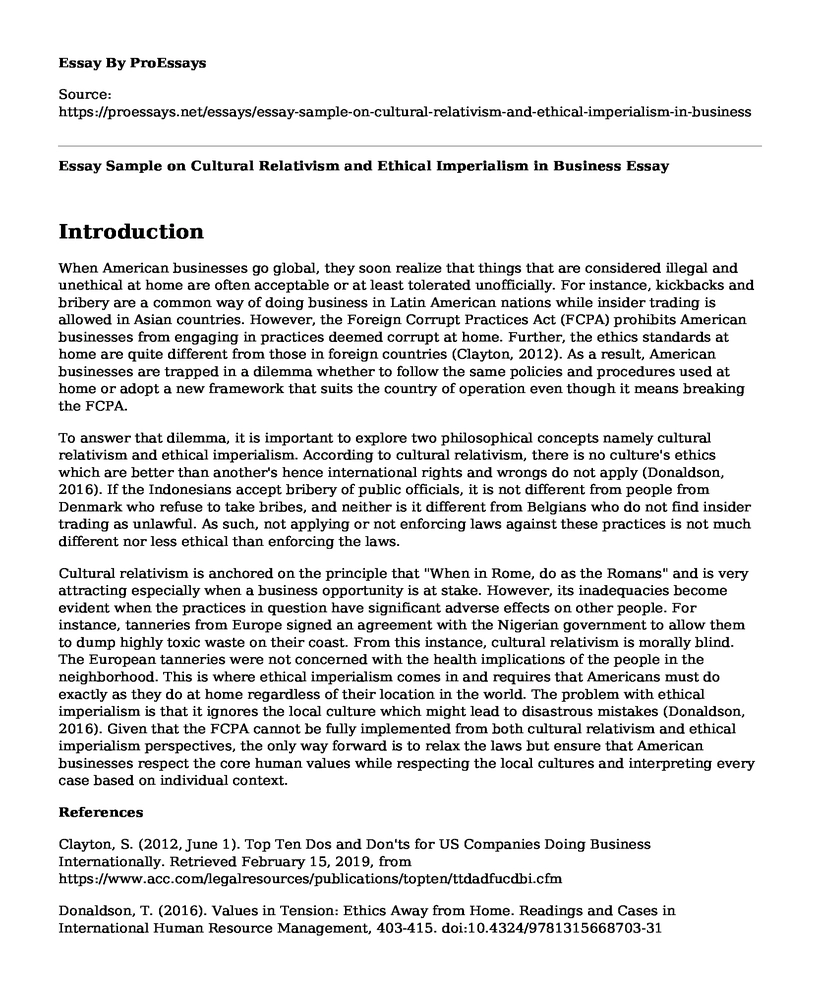Introduction
When American businesses go global, they soon realize that things that are considered illegal and unethical at home are often acceptable or at least tolerated unofficially. For instance, kickbacks and bribery are a common way of doing business in Latin American nations while insider trading is allowed in Asian countries. However, the Foreign Corrupt Practices Act (FCPA) prohibits American businesses from engaging in practices deemed corrupt at home. Further, the ethics standards at home are quite different from those in foreign countries (Clayton, 2012). As a result, American businesses are trapped in a dilemma whether to follow the same policies and procedures used at home or adopt a new framework that suits the country of operation even though it means breaking the FCPA.
To answer that dilemma, it is important to explore two philosophical concepts namely cultural relativism and ethical imperialism. According to cultural relativism, there is no culture's ethics which are better than another's hence international rights and wrongs do not apply (Donaldson, 2016). If the Indonesians accept bribery of public officials, it is not different from people from Denmark who refuse to take bribes, and neither is it different from Belgians who do not find insider trading as unlawful. As such, not applying or not enforcing laws against these practices is not much different nor less ethical than enforcing the laws.
Cultural relativism is anchored on the principle that "When in Rome, do as the Romans" and is very attracting especially when a business opportunity is at stake. However, its inadequacies become evident when the practices in question have significant adverse effects on other people. For instance, tanneries from Europe signed an agreement with the Nigerian government to allow them to dump highly toxic waste on their coast. From this instance, cultural relativism is morally blind. The European tanneries were not concerned with the health implications of the people in the neighborhood. This is where ethical imperialism comes in and requires that Americans must do exactly as they do at home regardless of their location in the world. The problem with ethical imperialism is that it ignores the local culture which might lead to disastrous mistakes (Donaldson, 2016). Given that the FCPA cannot be fully implemented from both cultural relativism and ethical imperialism perspectives, the only way forward is to relax the laws but ensure that American businesses respect the core human values while respecting the local cultures and interpreting every case based on individual context.
References
Clayton, S. (2012, June 1). Top Ten Dos and Don'ts for US Companies Doing Business Internationally. Retrieved February 15, 2019, from https://www.acc.com/legalresources/publications/topten/ttdadfucdbi.cfm
Donaldson, T. (2016). Values in Tension: Ethics Away from Home. Readings and Cases in International Human Resource Management, 403-415. doi:10.4324/9781315668703-31
Cite this page
Essay Sample on Cultural Relativism and Ethical Imperialism in Business. (2022, Nov 17). Retrieved from https://proessays.net/essays/essay-sample-on-cultural-relativism-and-ethical-imperialism-in-business
If you are the original author of this essay and no longer wish to have it published on the ProEssays website, please click below to request its removal:
- Essay Sample on Managing Cross-culture Negotiations
- Essay on Native People Living in the US
- The International Business Environment Paper Example
- International Business Perspective Essay
- Challenges Posed by Culture to International Business Paper Example
- Cultural Experience Field Report
- Comparison of Historical Events from Pre-Columbian Native American - Report Example







